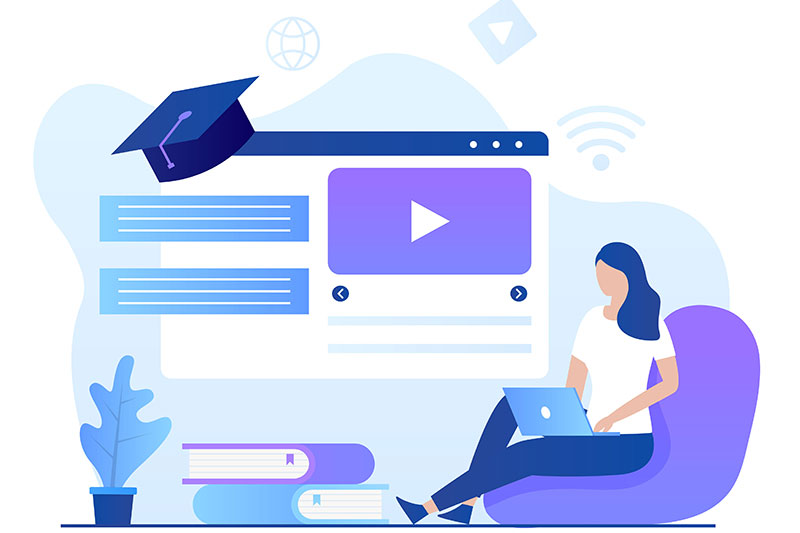Teaching Strategies and eLearning in Alternative Certification Programs for Educators
E-Courses are especially complementary to the teaching profession. Not to mention, teacher candidates can undertake e-courses to enrich their teaching strategies while enrolled in alternative certification programs.
Considering further that the e-learning market continues to advance, with an Allied Market Research report predicting it will reach over $840 billion by 2030, what’s stopping you from earning a slice of the pie?

How Alternative Certification Programs for Educators Work
Alternative teacher preparation programs provide a secondary way for non-education degree holders to qualify and become licensed educators.
Most programs take a year or 18 months and are flexible, with many allowing trainees to take the course online.
Each state sets its own requirements regarding alternative certification programs for aspiring teachers, and the state education agency lays down clear guidelines on what an acceptable certification program should look like.
Overall, though, most states require anyone who wishes to pursue alternative certification to have a bachelor’s degree and pass a background check.
Your first step to alternative licensure is choosing the state where you want to work as an educator.
Next, decide the subjects and grade level you want to teach. This step is essential because you’re certified to teach a specific subject area and grade level.
Check the state education department for approved teacher preparation programs and choose one. Apply for the program, after which they’ll screen you to see if you qualify.
Once accepted, you’ll:
- Go through the training
- Finish the set coursework
- Fulfill the requisite student teaching experience
- Pass licensure exams
- Apply to the state education board or agency for your certificate
- Pass background checks
- Receive your license
After receiving your certificate, you can apply to teach in schools anywhere in the approving state.
– How to create a certificate for online courses
What happens if you wish to teach in another state? Some states have teacher license reciprocity, meaning they can license teachers who hold a certificate from another state. Still, they may require applying candidates to meet additional requirements.
For example, they may ask you to take additional training, cover extra coursework, or have taught for a specific number of years. At least 43 states require out-of-state teachers to undergo further assessments before getting a license.
When you apply to work in states that do not recognize your teaching certificate, you’ll need to go through the licensing process for each state.
So, find out if the states where you intend to teach have reciprocity arrangements with each other; it will save you time, effort, and money.
Why Learn Teaching Strategies via Alternative Certification Programs?
Among the numerous benefits of pursuing an alternative teacher credentialing program are:
1. It’s Affordable
It’s far cheaper to take an alternative certification than pursue a four-year education degree in college.
If you already have an undergraduate degree, there’s no point in going back to college for another degree when you can study for certification at a lower cost.
2. It Takes A Shorter Time
Most alternative licensing programs take 1–2 years, with many taking just one year.
Compare this to the traditional educator licensing pathway that requires four or five years of college, and you can see the massive time savings this option gives you.
3. It Can Earn You A Degree and a Certification
Some alternative licensure programs are structured to give you a teaching certificate at the end of your training. Others give you a degree and a certificate. So you get to pick what’s best for where you’re going in your career.
Many individuals with advanced degrees opt for the certificate-only route because that serves their interests best.
Those with only an undergraduate degree can take the master’s degree pathway, which allows them to earn an education-related master’s degree and obtain a teaching license.
4. It Offers Flexibility in Learning
Alternative licensure pathways are flexible. Most offer online and hybrid lessons, so one does not have to attend class in a physical classroom.
You can enroll and complete the program without giving up work, business, and other pursuits.
Additionally, you can adjust your study times and pace based on your availability. Busy during the day? Take classes in the evening. Or take more classes over the weekend.
– Blended learning: a combination of online and face-to-face learning
5. It allows You To Take Other Courses Simultaneously
You’ll need more than a degree and educator license to stand out as a teacher and increase your attractiveness to employers.
Boost your skill set with extra courses that delve into effective teaching strategies for different circumstances. These are bound to make you a valuable addition to any school.
Educators can consistently work toward professional development with one or more online learning options.
There are lots of courses developed with educational professionals in mind. Some educators create short courses to share skills in areas where they notice gaps.
Want to help your colleagues benefit from the knowledge and skills you gained from a recent advanced training you underwent?
You can create a course to share your knowledge and train and guide teachers with little experience.
– Tips for creating online classes from traditional classes
eLearning Courses Trainees Can Take to Refine their Teaching Strategies
Teachers often expand their knowledge, skill and teaching strategies through continuing professional education (CPE), with many states requiring educators to meet certain CPE hours before their teaching credentials can be renewed.
Taking e-learning courses can help teachers take their professional development a notch higher, as many of these courses offer the latest expertise in different areas.
Below, we share some online courses that teacher candidates can take while enrolled in alternative licensure programs to complement their teaching role.
- Inclusive education: Courses under this cover many sub-niches, among them teaching diverse students and gender equality.
- Effective communication: Helps teachers improve their communication with students, parents, non-teaching staff, fellow faculty members, leaders, and community members.
- Organization skills: Between the physical, online, and hybrid classes and all their other responsibilities, teachers must find ways to stay organized to get things done efficiently and on time.
- Support for students who’ve suffered trauma: This course shows you how to be trauma-aware, interpret different student behaviors, and support affected students.
- Sustainability: A course on sustainability can show you how to discuss sustainability and climate change with your students and initiate sustainability projects in school and the surrounding community.
- Technology: The thing about technology is that it keeps changing, so you must keep updating your knowledge of what’s current.
- Digital skills: Effective teachers help their students master the digital skills needed today, as students use them both in and out of the classroom.
Today, schools rely on technology more than ever before. Therefore, when you improve your competence in technology, you become a valuable resource for your employer.
Tech skills could earn you a promotion, not to mention inject novelty into your teaching strategies.
The best part about online courses is they are flexible, and you can learn at your own pace. Plus, most are short, with lessons delivered in small chunks that are easy to digest. That makes it possible to take several courses at once or enroll for each in quick succession.
eLearning Best Practices for Teachers and Students
Consider these best practices to increase course effectiveness and ensure e-learning success:
For Course Creators
1. Use various teaching techniques
Incorporate content delivery options such as video, webinars, instructor-led lessons, and Q&A sessions. Where possible, introduce guest trainers or industry experts. Varying your lesson delivery precludes boredom and keeps students interested in the coursework.
– How to create videos for online courses
2. Challenge your students
Push your students to get them out of their comfort zones. You’ll be helping them grow, gain new insights, overcome their fears, and grow in confidence.
To do that try to create a game dynamic. The sense of competition and evolution is inherent in the human being and stimulates their ability and willingness to go further.
– How apply gamification in eLearning
3. Embrace adaptability
Adaptability allows you to change how you deliver lessons.
Explore new teaching strategies, improve your ideas, be open to changes in your industry, handle challenges correctly, and manage situations as they arise.
For Students
1. Ask questions
Asking questions allows you to probe the trainer’s ideas further and expand your understanding of the topics.
Many e-learning trainers are happy to engage one-on-one with their students and help them achieve what they hope to gain from the course.
2. Stay motivated
One of the biggest challenges for e-learners pursuing alternative certification programs is finding the motivation to show up for lessons consistently.
Taking two or more simultaneous courses is no mean feat. There’ll be many moments of exhaustion, and you’ll often feel rushed as you navigate from one course to another. But the sense of achievement and reward when you finish all courses is worth the extra effort you put in to succeed.
3. Revisit Course Materials and Resources
Return to your course material often to see whether you can gain new insights from what you learned.
Likewise, go through the resources your trainer provides and learn from the depth of knowledge they offer.
Choose a platform that best suits your needs

eCourses provide a practical solution for teachers to level up their skills and close any skill gaps that could make them less competent at work.
Courses suitable for teacher candidates in alternative licensure programs vary from classroom-related skills that involve dealing with students, such as dynamic teaching strategies, to life skills like organization and transferable skills like technical and digital abilities.
Coursify.me offers the perfect platform for those who want to create courses and make their classes available online in the best way possible.
Dynamic and customizable Learning Management System (LMS), Coursify.me serves companies and professionals in more tan 60 countries.
– Whats is a Learning Management System
To know more, visit our website, test the platform and start selling your online courses right now.

